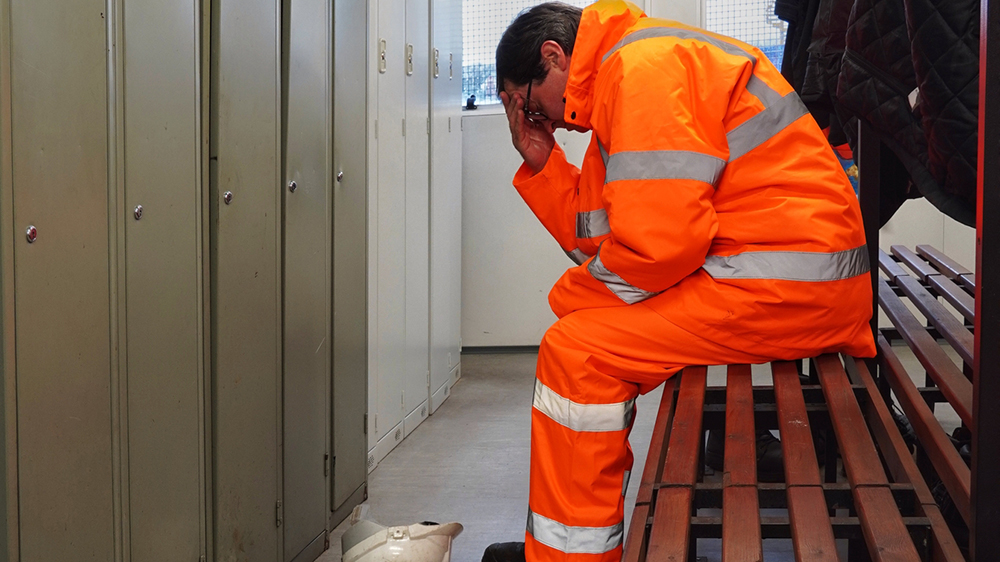
As part of Stress Awareness Month 2022, Emma Mamo of wellbeing charity Mind, explains how to spot signs of stress in your construction colleagues and what you can do to help.
What signs could indicate that your co-worker is experiencing unmanageable stress?
It can be really difficult to identify whether someone is experiencing a mental health problem at work, such as depression or anxiety, as often people struggle in silence and find it difficult to know how to ask for help. This is especially the case within male-dominated industries such as construction, given men tend to be less likely to reach out for support. Stress isn’t a mental health problem, but it’s related to our mental health – prolonged spells of pressure or stress can cause or worsen mental health problems. How someone responds to stress will vary from one colleague to another, but it could manifest at work could be things like difficulty making decisions, being more irritable than usual, and struggling with punctuality. Someone who is usually outgoing could become withdrawn, take less care over how they look, their appetite and weight may change and they may be tired more than usual as their sleep is likely to be affected. However, there might be no outward sign that someone is struggling.
What are some of the key triggers of stress in the workplace?
What one person finds stressful may not have the same impact on someone else – it depends on the individual. But there are some commonly cited causes of poor mental health at work which include things like long and unsociable working hours, excessive workloads, unrealistic targets and deadlines, low pay and difficult relationships with managers, colleagues and clients or customers. If you’re based on site, it can be hard to do the things you might do outside work to help keep you mentally healthy, such as taking regular exercise and eating a healthy diet. The physical environment – such as light, noise levels and temperature – also has a massive impact on our wellbeing and these things are much harder to control if you work outside than if you’re based in an office.
If you believe your colleague is being negatively affected by stress, what is the best way to approach the subject with them?
If a colleague has been experiencing problems with stress or poor mental health for a while, they might have become quite good at hiding them, and pretending everything is OK. Even if you’re not sure, if you’re worried about a colleague, talk to them, as it could make a huge difference. It could even be the difference between life and death. Try to adopt a sensitive, common-sense approach. The rules of thumb are:
- Encourage people to talk – Start by talking about general wellbeing, and let people know that they can talk to you if they need to. Remember everyone’s experience of mental health problems is different, so focus on the person.
- Avoid making assumptions – Don’t try to guess how they are feeling, what symptoms a co-worker might have and how these might affect their life or their ability to do their job – many people are able to manage their condition and perform their role to a high standard.
- Respect confidentiality – Remember mental health information is confidential and sensitive. Don’t pass on information unnecessarily – not least because this breach of trust could negatively impact someone’s mental health.
Even if they don’t want to speak about it at that time, you’ve still let them know you’re there and they can talk to you when the time is right. In addition, small gestures like thanking people for their work, making tea or coffee and asking about their plans outside work – can make a huge difference.
If you believe your colleague is suffering from stress, is it ok to raise the subject with management on their behalf?
It depends on the relationship you have with your colleague and your manager, but it’s always best to raise your concerns with the colleague directly, and if indeed they are struggling with work-related stress or poor mental health, encourage them to talk to someone they trust – such as a friend, family member, their manager or a GP. Going directly to management without speaking to them first is only likely to make their mental health worse and could be seen as a breach of trust based purely on assumptions you hold about a colleague, rather than what is actually going on.
As a manager, what steps should you take to help people in your team who are suffering from stress?
Promoting good mental health within the workplace is everyone’s responsibility, but especially your employer’s and that of line managers and HR professionals. Hopefully your employer will offer a range of workplace wellbeing interventions which can benefit all staff, regardless of whether they are experiencing stress or poor mental health or not. Measures such as flexible working hours, access to counselling and other talking therapies via an employee assistance programme (EAP), subsidised exercise classes or gym membership and generous annual leave can all make a huge difference and save employers money through increased staff morale, productivity and retention, and decreased sickness absence. But we know that not all employers invest in staff wellbeing as much as they should.
Managers should try to mitigate the impact of work-related contributory factors to stress and poor mental health. One way to do this is using Wellness Action Plans – available to download for free from Mind’s website. These tools help facilitate conversations between employees and their line managers and jointly identify the specific parts of the job that may be most challenging to them, and what their manager and other colleagues can do to help lessen the impact. We have separate guides for people who attend a workplace, work remotely or work in a hybrid way.
Where can construction workers and managers go for more help dealing with stress and other mental health problems?
If you’re experiencing unmanageable stress or poor mental health, it’s important to try to talk to somebody. Telling someone how you feel can be a relief and might be a good first step towards getting help. Friends and family can be there for you emotionally, but also help you think about what support you could benefit from.
If you feel unable to talk to someone you know, and you’ve noticed changes to your feelings, thoughts and behaviours that last longer than two weeks, keep returning, or are affecting your daily life, contact your GP who can talk you through available treatments. If you’re feeling suicidal, self-harming or seeing or hearing things that others don’t (psychosis), call 999 and ask for an ambulance, or go to A&E.
Further info:
- Mind’s Information on supporting someone who is feeling suicidal
- Mind’s Information on stress
- Mind’s Information on workplace, coronavirus and mental health
- Mind’s Infoline provides confidential information and signposting and is available by calling 0300 123 3393 (Monday-Friday 9am-6pm)
- Samaritans offer a free, confidential 24 hour listening service – phone 116 123 or email [email protected]
- The Mental Health at Work website: www.mentalhealthatwork.org.uk
- Mates in Mind is a UK charity raising awareness and addressing the stigma of poor mental health across various industries, including construction, as well as related sectors including transport, logistics, manufacturing, and others
Emma Mamo is head of workplace wellbeing at Mind.










